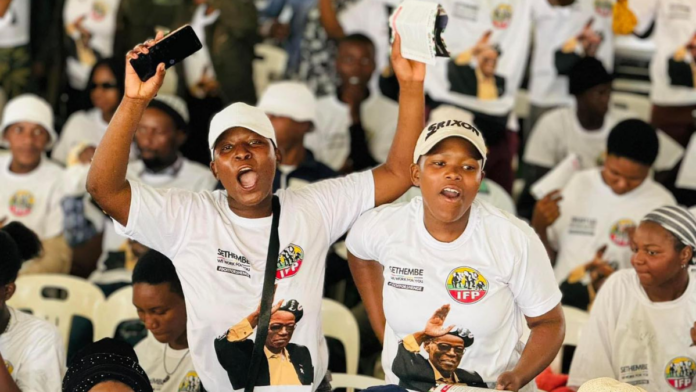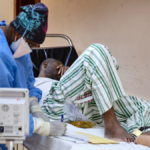| Universal access to healthcare | Climate change | Food security |
| Social grants | Basic income grant | Tuberculosis |
| HIV | Corruption | Gender-based violence |
Here’s what Inkatha Freedom Party (IFP) says about health issues.
Universal access to healthcare
The IFP says it will improve healthcare by putting the elderly and vulnerable children first, and expand citizens’ access to essential services like electricity, sanitation and safe water. It will do this through social security — read more on that further down.
The IFP says it agrees with universal health coverage (which gives everyone access to the same basic health services, regardless of whether they can afford to pay for it) but will review the National Health Insurance (NHI) scheme “to address its funding model while clearly defining the role of public and private health service providers and that of medical aid schemes”. The IFP voted against the Bill in the National Assembly (in June last year). The NHI Bill was passed by Parliament in December.
The national health department has already started to appoint NHI staff. In 2022, the minister of public service and administration approved positions for 44 technical experts who would advise the NHI and heads for four of the five chief directorates were appointed by July 2023.
Universal health coverage is a 2030 sustainable development goal.
On health facilities and services the party says the following:
- There will be at least one regional hospital in each of the 52 health districts and at least one tertiary hospital in each province, and clinic services will be expanded in disadvantaged communities. (Patients are referred from regional hospitals to tertiary hospitals for more specialised services. Our count shows that by 2019, there were 48 regional hospitals in South Africa, but not necessarily one in each district.)
- An IFP government will ensure that primary healthcare is delivered at the district level and it will give district managers and the people in charge of a healthcare facility (such as a hospital) the power to make more decisions without first having to get approval from the provincial health department. (At the moment, most big decisions made by hospitals can only be made if provincial health departments approve them.)
- They will make medicine cheaper and give people access to complementary and traditional medicines. The party says it will invoice countries whose citizens are in South Africa illegally and are using the country’s overstretched health services.
- There will be more support for mental health issues.
- A sanitary dignity programme will be available for all needy schoolgirls. (This programme, started in 2019, hands out sanitary pads to schoolgirls and helps with menstrual education so that they don’t have to miss school.)
About health workers the party says the following:
- It will make working conditions for healthcare workers better and fix understaffing, poor leadership and infrastructure issues.
- Health staff shortages will be dealt with by employing trained, unemployed healthcare providers. They promise better support and pay for doctors and nurses.
Click here to go to the elections manifesto analysis tool.
Climate change
The IFP manifesto doesn’t say how it will deal with climate change specifically, although it does mention that the world faces “a triple environmental crisis in biodiversity loss, climate disruption and increasing pollution”.
The party mentions renewable power sources only as part of their plan to improve the country’s electricity provision. An IFP government will promote wind turbines and solar power for private investment in power generation and grid supply. They will install solar panels in all new government houses and support hydroelectric power.
An IFP government will maintain coal production for energy and chemical products, keep nuclear energy under state control and favour gas for domestic use.
The manifesto doesn’t take into account the country’s international commitments to slow global warming (such as, for example, the Paris Agreement; under this agreement South Africa pledged to work towards achieving net zero carbon emissions by 2050.) The effects of climate change — a hotter Earth and more droughts and storms — will increase lung diseases, make HIV and TB spread faster, and allow diseases transmitted by insect hosts, such as malaria, to spread to countries where they’ve never been experienced before.
Click here to go to the elections manifesto analysis tool.
Food security
The IFP manifesto links health to nutrition. The party promises people will have access to food and will exempt all staple foods in poor households from VAT.
The party will fix child malnutrition by supporting families who can’t afford to feed their vulnerable children through a food voucher system.
In 2022, one in five people in the country didn’t have enough food, and 12.9% reported going hungry.
An IFP government will roll out free scholar transport and nutrition schemes in all public schools. It doesn’t mention how they will pay for the additional expense.
Click here to go to the elections manifesto analysis tool.
Social grants
An IFP government promises to put the elderly and vulnerable children first. They will review all grant categories and increase the old age and child support grant, and expand the food voucher system for poor households.
Currently child support grants are R530 per month per child, state pensions are (from 1 April) R2 180 per month for people of from 60 years old and R2 200 per month for those 75 and older.
The party promises a modern, functioning grant system that is fit for purpose and pays the correct grant recipients, on time, while linking grants to opportunities and training to uplift recipients. It will also offer other forms of social support, like funding for NGOs that look after the most vulnerable and legalising “baby saver” baby boxes to protect abandoned babies and support mothers in crisis pregnancies.
Funds for their programmes will come from restructuring the economy and the fiscus, cutting “government ministries and their lavish spending”.
Click here to go to the elections manifesto analysis tool.
Basic income grant
The party’s manifesto doesn’t mention a basic income grant. However, it says an IFP government will add an unemployed graduate grant of R3 000 to the social support list, for a fixed period while graduates find meaningful employment
Click here to go to the elections manifesto analysis tool.
Tuberculosis
The IFP manifesto doesn’t mention tuberculosis specifically. TB kills more people than any other illness in South Africa.
Click here to go to the elections manifesto analysis tool.
HIV
The IFP manifesto doesn’t mention HIV. About 7.8-million South Africans are living with HIV of whom about 75% are on antiretroviral treatment.
Click here to go to the elections manifesto analysis tool.
Corruption
An IFP government promises to root out corruption and wasteful spending and end the “inexcusable practice” of underspending, which means that money gets sent back to the fiscus.
The manifesto says “essential equipment and medical supplies never reach those who need them, due to corruption, tender fraud and operational mismanagement” and so the party will clamp down on corruption while rooting out fruitless, wasteful and irregular expenditure.
An IFP government promises a zero-tolerance policy towards corruption, including prompt firing and prosecuting corrupt officials, no matter their rank or political affiliation. The party promises that special courts to deal with corruption will be fully operational.
Click here to go to the elections manifesto analysis tool.
Gender-based violence
An IFP government promises that special courts to deal with gender-based violence (GBV) and femicide will be fully operational. (A ministerial advisory task team on the adjudication of sexual offences has worked for over a decade on getting more courts to deal with sex crimes and help victims. In 2022, there were 299 courts for dealing with sexual offence matters. While 102 of these provided a catalogue of victim-support services, there was still a significant backlog of cases.)
The party says there will be dedicated police officers who are specially trained to deal with GBV and femicide. They will be deployed at all police stations where crime is rampant, while ensuring that survivors can easily access the services they need.
Crime statistics for the 2022/23 financial year show that sexual assault and rape make up more than 90% of all reported sexual offences. Over the past 10 years, numbers have not come down much, with the total number of reported cases hovering around 52 000 per year. Almost 43 000 rapes were reported in the past year, similar to the numbers over the last decade.)
Click here to go to the elections manifesto analysis tool.
Read the full, original manifesto here.




